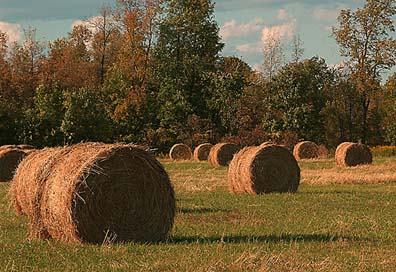Kentucky's Producers Focusing on Hay Quality
Kentucky's Producers Focusing on Hay Quality

This year’s hay production is much better than a year ago thanks to timely rains. Also, producers are putting more emphasis on this crop than they did in years past, which is attributing to improved quality.
Hay production in 2006 is estimated to exceed 6.5 million tons, according to the U.S. Department of Agriculture’s National Agricultural Statistics Service, Kentucky Field Office. Kentucky is the largest cattle state east of the Mississippi River, and hay and forage production is vital to the state’s cattle industry.
“We are having a much better year for making good quality hay in Kentucky,” said Tom Keene, hay specialist with the University of Kentucky College of Agriculture. “For the most part, we’ve had timely rains and had the ability to get our hay up. There have been some timely windows of opportunity for three or four cuttings of alfalfa and now a second cutting of grasses, something we did not have in 2005. At this time last year many producers were feeding hay stocks they had made earlier in the year and many were quite tense about if we’d have enough hay. This year, I feel very good that we will have enough hay to feed the livestock in Kentucky and maybe even have some excess.”
Commercial hay producers are also having a good year, Keene said. The Midwest and Deep South are suffering through drought conditions and are in need of hay. If a producer has the resources to market hay outside of Kentucky, this is a good opportunity to do so, he said. However, the right packaging is necessary to ship the hay.
“Kentucky producers are becoming better managers of their hay crop,” he said. “When tobacco was king, hay was a secondary item on the agenda and it got secondary billing in terms of management, fertilizer and so forth. But I think, now producers are coming to the realization that producing quality hay is an opportunity for them not only in terms of feeding their livestock more economically but also potentially feeding more livestock and selling their surplus hay.”
Having hay tested for quality is essential, otherwise producers do not know which hay to allocate to which livestock. If they put up extremely nice alfalfa or alfalfa mix hay, they might not need to feed that high-quality hay to their dry cows. Instead, they can sell the higher quality hay and feed the rolled bale fescue to the cows. A hay testing program is available through the Kentucky Department of Agriculture, and the information can be found on its Web site at http://www.kyagr.gov. KDA can list a producer’s hay for sale on its Web site once it has been tested.
“We have been and continue to place a lot of emphasis on quality,” said Garry Lacefield, UK forage crops specialist. “One of the greatest advances I’ve seen in the past decade plus, for being able to capture and store more of our high quality spring growth, is round bale silage. As you go up and down the roads you are seeing more and more of this out there. Producers are realizing that this one tool, which they can implement in most beef cattle operations, does not require as long a window to get their forage harvested. We are seeing much higher quality product be available for feeding because of the round bale silage.”
Many farmers have also taken advantage of cost share money through the tobacco settlement to build or retool existing buildings for hay storage, Keene said. An estimated $15.8 million has been allocated to counties for this program, he said.
“More producers are realizing they are losing hay by storing it outdoors and are taking advantage of these funds to further improve their hay operations,” he said. “We know we can lose 33 to 50 percent of round bale hay stored outside and when you feed it, you lose even more. It doesn’t take long to put a pencil to that and see that by putting it in a structure you can either bale less hay or feed more animals. It can pay big dividends.”